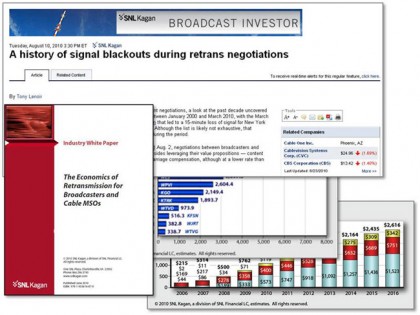In a research report released by SNL Kagan this week (hat tip to Multichannel News), new numbers show just how high retransmission fees are rising for cable, telco, and satellite TV operators. According to the Kagan report, operators paid $1.14 billion in retrans fees in 2010, with that number projected to rise to $1.46 billion in 2011, and to $3.61 billion by 2017.
No wonder industry folks are so touchy about Netflix getting content on the cheap.
Increasingly, licensing deals look to be a large part of the revenue strategy for TV networks. I haven’t seen anyone draw a line specifically between that strategy and the reduced effectiveness of television advertising, but I can only assume that the two aren’t unrelated. Sure, ad revenue is still predicted to rise through 2014, but nobody is underestimating anymore the disruptive power of the Internet and new business models for television delivery. With audience attentions fragmenting, broadcasters want a more predictable and reliable stream of revenue.
Meanwhile, as retrans fees rise, and the fights among content distributors get nastier, the government is readying itself to weigh in on the matter. The FCC issued a Notice of Proposed Rulemaking (NPRM) on retransmission consent earlier this year, and has begun to collect comments from industry players. Cablevision has filed comments already, proposing that the FCC: forbid must-carry rules around secondary broadcast channels, require transparency from broadcasters on retrans fees, and forbid practices that allow broadcasters to set different prices for service providers based on “size or other factors.”
Transparency in retransmission deals? Yeah, good luck with that.

That is an interesting postion for Cablevision…*cough*MSG on FiOS*cough*
“No wonder industry folks are so touchy about Netflix getting content on the cheap … nobody is underestimating anymore the disruptive power of the Internet and new business models for television delivery.”
I am estimating the disruptive power as being quite low. At least in the short to medium term. And I don’t think I’m underestimating.
As the normally excerable Todd Spangler accurately notes, the average consumer would need 600 GB Per Month to go all OTT. A heavy HD consumer like me would need 1.4 TB per month.
Unless you think the current FTTH footprint is about to spring from 2% to 50%, multicast is here for a while.
I agree with Chucky, not sure this is really related to the internet at all. Easier to blame it on simple greed I think.
It will be interesting to see how this plays out. Personally I’m already past the point where I consider the amount of money I pay for TV per month to be acceptable, especially since I at least watch less than I used to (new baby, more travel, internet and other distractions). Plus I get more of my movies at least on demand. So I’ve been carefully cord-shaving for a while. But given how cable companies package channels there’s not a lot of options. With HBO at $20/month, I dropped it. But if A&E goes up by 50 cents, and I’d like to not pay the extra $1/month the cable company wants to pass along, I really don’t have a lot of choices. I’d have to drop back to expanded basic or something, giving up all HD access etc.
I can live without the ability to pick individual channels I’m willing to pay for. But I do think we’re going to see more tiers in our future. Certainly sports programming costs are going up too fast to be born by all cable subscribers when a lot aren’t interested. Could be the end of a lot of channels if this happens…
Chucky and Glenn- I don’t disagree that greed plays a big role here, but I do think there is an emotional reaction to the OTT revolution that is impacting how the networks think. Also, I don’t think people are going to go all-OTT any time soon, but audiences are fragmenting (whether through cord-shaving or because they’re playing more Angry Birds on their iPads), which means advertisers have to spread their dollars around. And that puts more pressure on the retrans revenue stream.
One other note- I agree with Glenn that we’re likely to see more service tiers in the future. I’ve written about that in the past; unfortunately I don’t remember when or where…